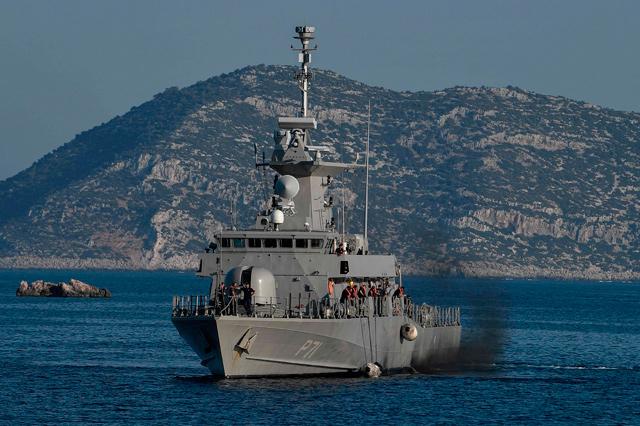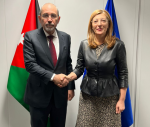You are here
Turkey stages new military exercises in eastern Med
By AFP - Aug 29,2020 - Last updated at Aug 29,2020

The Hellenic Navy Roussen or Super Vita class Fast Missile Patrol Boat P 71 HS Ritsos patrols off the tiny Greek island of Kastellorizo, in the Dodecanese, the furthest southeastern Greek island, two kilometres from the Turkish mainland on Friday (AFP photo)
ISTANBUL — Turkey on Saturday launched new military manoeuvres in the eastern Mediterranean expected to last two weeks, as tensions between Ankara and Athens mounted over maritime borders and gas drilling rights.
The dispute has reignited the long-running rivalry between Greece and Turkey, with the two neighbours staging rival naval drills.
In a message on NAVTEX, the international maritime navigational telex system, Turkey said it would carry out "shooting exercises" from Saturday until September 11 in a zone off the southern Turkish town of Anamur, north of the island of Cyprus.
Ankara had already announced on Thursday that military exercises would take place on Tuesday and Wednesday in a zone further east.
In a sign of the volatility of the situation, Turkey's defence ministry said Friday that fighter jets had on Thursday intercepted six Greek aircraft which were approaching a zone where a Turkish research ship was deployed, forcing them to turn around.
It was the deployment of the Turkish research vessel Oruc Reis into Greek waters on August 10 that caused the current spike in tensions.
The European Union on Friday warned Turkey it could face fresh sanctions — including tough economic measures — unless progress is made in reducing soaring tensions.
Turkey responded angrily to the warning.
“The fact that the EU is appealing for dialogue on the one hand and at the same time making other plans reflects a lack of sincerity,” Vice President Fuat Oktay said on Saturday.
“Turkey will not hesitate to defend its interests,” he said.
Other irritants have marred ties between Ankara and Athens including the question of migrants crossing from Turkey to Greece, Turkey’s conversion of some Byzantine churches and cathedrals into mosques and Greece’s intention to extend its territorial waters to 12 nautical miles from the current six.
‘Casus belli’
“You think we would accept such a thing?” thundered Otkay on Saturday, referring to Greece’s maritime border plans.
“If this is not casus belli, then what is it?” he said using a Latin term for an act or event used to provoke or justify war.
This immediately sparked a strong response from Athens.
“The unprecedented perspective of Turkey that it can threaten with the use of violence neighbouring countries when they exert their legal rights, is against the modern political civilisation but also against the fundamental clauses of the international law,” the Greek foreign ministry said in an English statement.
“We urge Turkey to understand that the international law is binding for all countries of the world. It’s not applied selectively.”
The crisis has split members of the NATO alliance and in a phone call with Turkish President Recep Tayyip Erdogan on Friday, alliance chief Jens Stoltenberg stressed the need for “dialogue and de-escalation”.
The Turkish presidency said Erdogan told Stoltenberg that “NATO should fulfil its responsibility against unilateral steps that disregard international law and harms regional peace”.
Related Articles
ISTANBUL — Turkey has extended once again a research ship’s quest for gas in contested waters of the eastern Mediterranean as Greece warned
ATHENS — Greece and Turkey on Monday smoothed over their most recent diplomatic spat by setting up a June meeting between their respective l
ATHENS — Turkey on Friday accused Greece of shunning dialogue and lying after Greek Prime Minister Kyriakos Mitsotakis said NATO-brokered ta


















